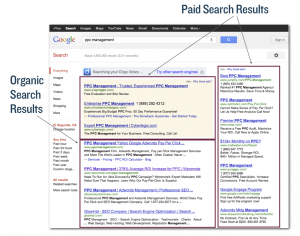When you look for something online, a search engine will show you two types of results: paid and organic search results. Organic results—also known as natural results—are the listings that appear because of their actual relevance to the search terms. Paid results (non-organic) are advertisements—site owners have paid to display their pages or listings based on certain keywords. When search results are listed, paid and organic results are set apart; often paid results are listed above the organic results, and have a shaded background, border or other visual indications. Web users should recognize the difference in order to make a more informed decision about the relevance of the results to their search. Conversely, marketers should be familiar with the differences too, to allow for the best return on investment dollars.
The Beauty of Organic Results
Organic results offer multiple benefits, including the perception of credibility and trust. High search engine rankings imply leadership in a particular industry and often translate into a better chance of click through to the page. On the flip side, consumers don’t always trust paid advertisements and sometimes avoid them, which can lead to a lower click through rate. As a site gains credibility, it ranks higher and that status builds the trust of both users and search engines. Though it may take months or even years to achieve high ranking, once it’s established, it’s easier to keep the ranking as your page continues to increase in credibility and trust among users. Aside from sometimes being seen as less trustworthy, paid listings will disappear if payment is not made. Organic listings are free and have the potential to be very profitable—but the key is to get a high position for a highly searched keyword. Paid search results can attract unrelated traffic and, in turn, those pay per click costs can add up.
The Pluses of Paid Results
Unlike organic rankings, one major benefit to paid results is that they are placed at the top of the rankings as soon as the ad placement is paid for; There is no need to wait for months or years for paid results to gain in credibility and move up the rankings. Paid search results can also be targeted toward very specific audiences, including by income, age, marital status, industry and education. This can lead to a better chance of being clicked on by the intended customers. And although it depends on the search terms, consumers who search using keywords that show a “high commercial intent”—a desire to purchase—are more likely to click on paid ads. These types of searches are often product- or brand-specific, and studies show paid results are clicked nearly twice as often over organic results. Often the best approach depends on many factors, including the type of business, the company’s objectives and its budget. For many organizations, a little of both organic search and paid search ads net the best results.


